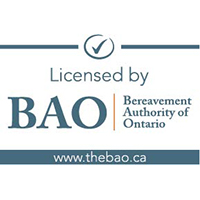Cremation is an alternative to earth burial or mausoleum entombment: it does not limit the funeral in any way. Should you choose cremation, you will still have the same options for memorialization that any other family has. Cremation can take place before or after the funeral service. In this section, we’ve answered the most common questions we are asked about cremation. If you require further information, please contact us at any time.
WHAT IS CREMATION?
Cremation is a process of reducing the body to bone fragments by applying intense heat for a period of two to three hours. The cremated remains, which are commonly referred to as “ashes,” are removed from the cremation chamber. They are then processed into finer fragments and placed in a temporary container. The ashes weigh typically between three and six pounds. An urn may be selected for the final disposition of the cremated remains.
WHERE AND WHEN DOES CREMATION TAKE PLACE?
Cremations occur at a crematorium in a special furnace called a cremation chamber or retort. Ontario regulations allow only one cremation at a time. Ontario regulations also state that crematoriums can only be situated on cemetery property.
DO WE NEED TO BUY A CASKET?
Ontario’s law requires that at a minimum, the deceased must be placed into a rigid combustible container. Many options of caskets and containers are available to you.
CAN WE PLACE PERSONAL MEMENTOS IN THE CASKET PRIOR TO CREMATION?
Many personal items may be placed in the casket; however, some items may need to be removed prior to the cremation process. All items left in the casket will be destroyed during the cremation. Your funeral director can advise you on what items may stay and what items must be removed from the casket.
DO WE NEED TO HAVE A FUNERAL IF WE SELECT CREMATION?
Cremation does not limit the type of funeral service that may be chosen. The same options that apply to earth burial are available with cremation. Some of these choices include: casket type, location of the service and visitation, music selection, open casket and the display of personal mementos. Some families elect to have a complete service at the funeral home or place of worship. Others prefer to have a procession to the crematorium, similar to that often done to the cemetery, for an earth burial.
IS EMBALMING REQUIRED?
Embalming is not mandatory; however, some circumstances may require it. If you prefer an open casket with a visitation prior to the service, embalming is highly recommended.
WHAT IS AN URN?
An urn is a container designed to hold the cremated remains permanently. It may be constructed from a variety of materials such as wood, bronze, copper, steel, pewter, granite, marble, clay pottery or fine porcelain. We have a large selection of urns available designed to reflect the lifestyle of an individual. Urns may also be personalized by engraving. Urns also come in a variety of sizes that allow more than one member of the family to have a portion of the cremated remains.
WHAT CAN WE DO WITH THE CREMATED REMAINS?
Burial
Inurnment
Scattering
Shipping
Keeping
IS CREMATION CHEAPER THAN BURIAL?
Typically, it is less expensive than earth burial. Depending on which cemetery is selected, the cremation cost may be less expensive than the purchase of a cemetery plot. There are coroner fees to authorize the cremation, an urn to purchase and possible transportation costs of delivering the urn to its final destination






